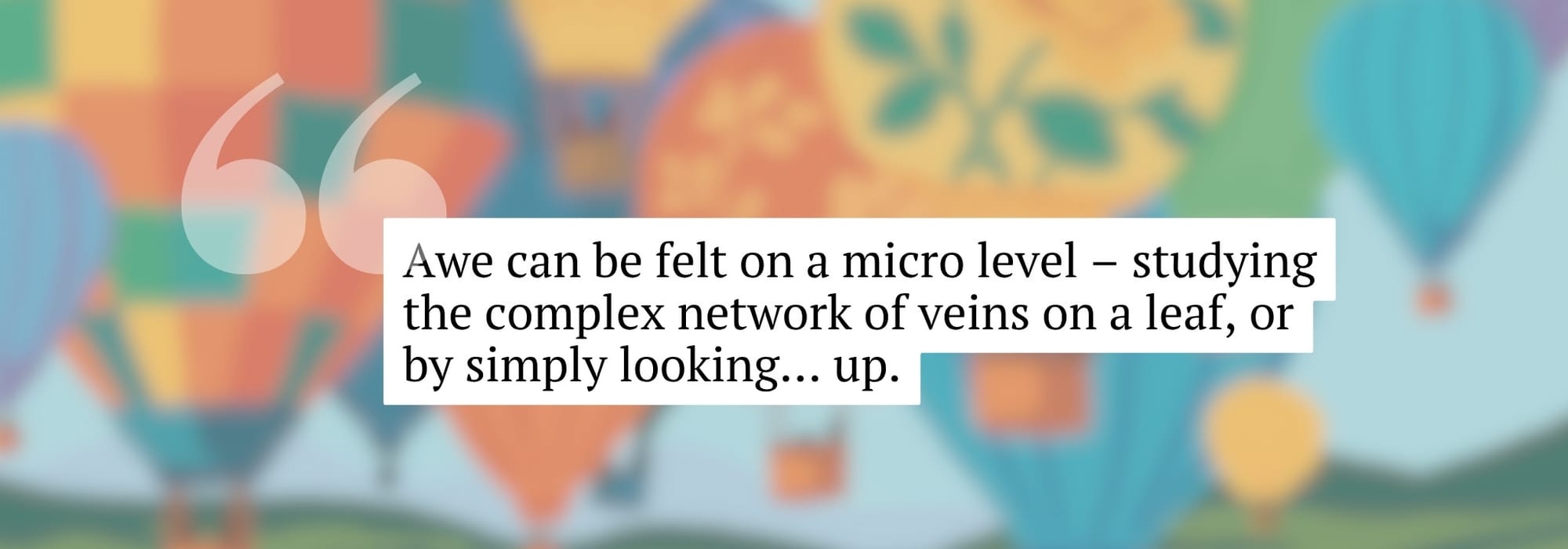Why considering the bigger picture in life can open the door to new horizons, and a richer view of the world
One place I always love to visit the most is the British Museum, and not just for the serenity of its peaceful reading room, or the transportive power of its historical treasures, but also, for the beautifully filtered sky above.
Time seems to stand still under that enormous glass roof, muting the distractions of everyday noise, and framing only what feels significant, as though, with each step around the courtyard, there’s a different perspective on reality.
Of course, a trip to London isn’t always on the cards whenever I need to take a step back and see the bigger picture, or poetically consider a different angle on a situation. And connecting to the vastness of something, especially the sky, can, of course, be felt closer to home. After all, there’s nothing quite like bathing under a sky full of stars to remember the world is much more than our everyday concerns.
But, let’s take time to remember the quieter ways of taking stock. From small, everyday rituals to reconnecting with our values, gaining a sense of perspective is within close reach.
What is perspective?
Our perspective on life influences how we respond to, or sometimes react to, situations. The glass half-full, half-empty analogy is a common example of how two people can view the same thing in different ways – but there are more aspects to this beyond pessimists and optimists. A sceptic might question what is even in the glass, while a physicist focuses on the matter, or an artist sees a tool to create.
So, perspective is our overall viewpoint on life, and is often shaped by our values and past experiences. To cultivate a broader sense of perspective, we need to step back and consider the context, which can be particularly helpful when it comes to understanding where other people are coming from.
Perception, however, is our inner lens, describing how we interpret something through our five senses and immediate experience. For example, if you interpret someone’s body language and tone of voice as welcoming, it gives you an on-the-spot perception of friendliness.
Understanding our perceptions and perspectives can help us identify any underlying biases or limiting ideas, which is essential for building stronger relationships and making better decisions. And it’s not just about conflict resolution; harnessing the ability to ‘zoom out’ when things are tough can help us navigate difficulties more easily.
It can be tricky at first, but shifting from outdated thinking to a panoramic outlook can open up exciting possibilities.

How to cultivate a sense of perspective
Realising we don’t have control over every area of our lives, particularly when it comes to other people, can create a more open mindset.
Picture this: you’ve just seen on social media that you haven’t been invited to a friend’s birthday brunch. “Am I not liked?” and “What have I done wrong?” questions might plague that moment, feeding into low self-esteem or a negative mindset. But we don’t have all the facts here, so jumping to conclusions will only narrow our outlook.
1. Role reversal
Standing in someone else’s shoes can help gain a healthier perspective on emotionally charged situations. One way is to imagine what your friend or family member would say to you if you’re feeling down or not good enough.
Let’s take the ‘people don’t like me’ narrative. Your nearest and dearest might say that you’re loved, and that other people’s perceptions aren’t your problem. Role play or role reversal is often used in therapeutic settings to shift perspective, enabling more profound empathy and growth in relationships.
Suppose you and your partner repeatedly clash over the same issue; it’s helpful to consider their values and past experiences. How their parents, friends, and upbringing have influenced their outlook on life can help you see the wider picture, and come to a mutual understanding.
2. Reconnect with values
Taking into consideration other people’s values is an excellent step, but let’s not forget your core belief system. What do you value most in life? Is it creativity, balance, family, achievement, honesty, or kindness, perhaps?
When you get clear on your values, you understand what motivates you. As a result, not only will you be less impacted by societal pressures, but you’ll also know why you’re doing what you’re doing, and this is crucial when it comes to prioritising what matters and letting go of the little things. Minor concerns will carry less weight when you create a life that truly reflects your values.
3. Rituals
We can all easily get sucked into the same old daily habits, whether it’s looking at well-worn content on social media, rushing to get to work, or checking messages while eating. Rituals are also regular acts, but they are carried out with meaning. So, instead of grabbing your phone when you wake up (guilty!), try listening to the sounds of nature, journaling your intentions for the day, or relishing in a slow, hot drink.
Daily rituals promote mindfulness and refocus our attention on what feels purposeful, helping us find more clarity through a different perspective.

4. Reach for the skies
We can also feel that slice of everyday magic by seeking out awe. Awe is being in the presence of something vast and powerful enough to experience a heightened sense of meaning, and reduced focus on the self.
Awe doesn’t have to involve looking at an impressive waterfall or canyon; it can be felt on a micro level, such as studying the complex network of veins on a leaf, or by simply looking… up.
Gazing at the stars, also known as cosmic bathing, can help us connect to the grand scheme of things. A 2024 study, published in the Journal of Environmental Psychology, introduced the Night Sky Connectedness Index, revealing a positive link between someone’s connection to the night sky and their happiness levels. If you feel brave enough, you can even allow your mind to wander past the speckled sky and into the galaxies beyond.
World-renowned physicist Brian Cox sums up the fleeting nature of our existence with the question: “What does it mean to live a finite, fragile life in an infinite, eternal universe?” When I hear this, I get a real sense of the preciousness of each day, while understanding we’re part of a greater story.
And if you can’t get out into nature, why not imagine it? Picturing yourself floating in a hot air balloon with a sense of awe washing over you is a lovely guided visualisation to practice. Noticing familiar places taking on different forms as you rise higher in the sky, with buildings looking like dollhouses, and rivers resembling ribbons, may provide that sought-after shift in perspective.
Perhaps, then, it’s feeling fastened to something bigger than ourselves that gives us the power of perspective. Whether that’s other people’s viewpoints, the beauty of nature, or the vastness of the sky above, a higher understanding is at the heart of seeing differently.


Comments